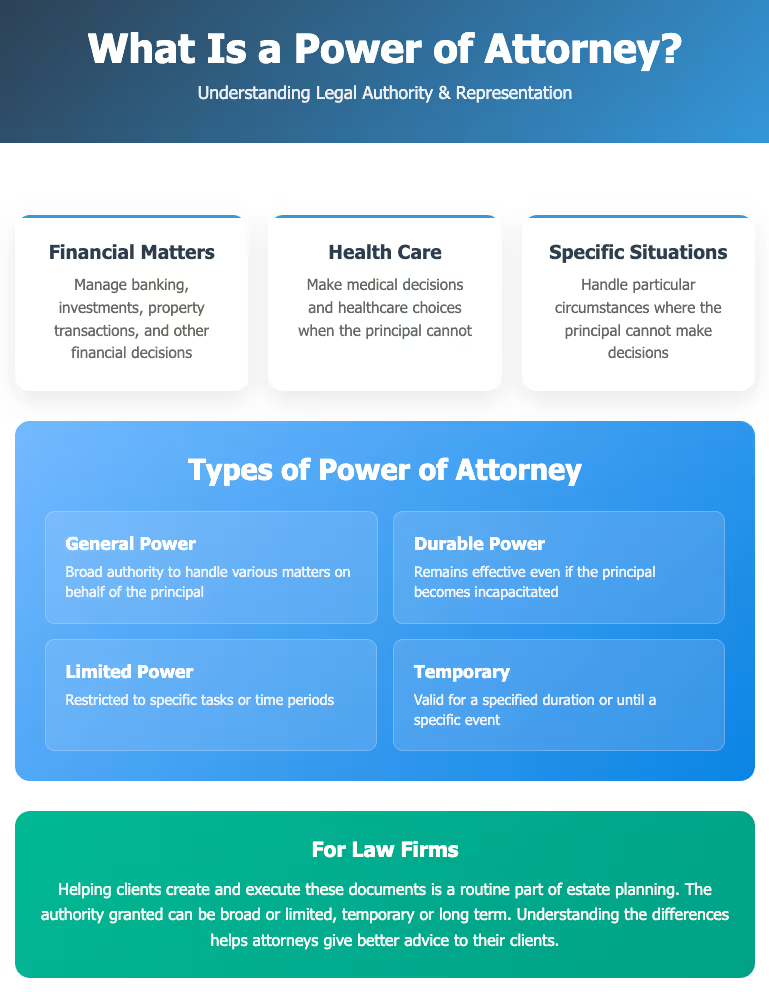When law firms handle estate planning or elder law matters, powers of attorney often come up. These documents are especially important for clients who want to protect their future and ensure their wishes are followed if they become incapacitated.
But what’s the difference between a general power of attorney and a durable power of attorney? More importantly, how can your law firm manage these requests more efficiently—perhaps with support from a remote attorney?
Let’s break down the basics of powers of attorney and where a remote attorney can assist your practice.
What Is a Power of Attorney
A power of attorney is a legal document that gives someone else the authority to act on behalf of another person, called the principal. These documents come in different types, each with its own rules and purpose. They are used to manage financial matters, health care, and specific situations where the principal cannot make decisions for themselves.
For law firms, helping clients create and execute these documents is a routine part of estate planning. The authority granted can be broad or limited, temporary or long term. Whether it’s a general power or a durable power, understanding the differences helps attorneys give better advice.

Types of Powers of Attorney
There are two main types of powers of attorney that law firms typically work with:
General Power of Attorney
This grants broad authority to the agent (also called the attorney-in-fact) to act on the principal’s behalf in financial, business, and legal matters. However, this authority ends if the principal becomes incapacitated.
Durable Power of Attorney
This remains valid even if the principal becomes unable to make decisions. It’s often used for long-term planning, especially for health care and financial matters.
Understanding the difference between these types helps lawyers guide clients through important decisions. Each serves a different need depending on the client’s current situation and future concerns.
Durable Power of Attorney: Long-Term Protection
A durable power of attorney is one of the most important documents in estate planning. It ensures that a trusted family member or attorney can act for the principal, even after incapacity. A durable power allows the agent to pay bills, manage finances, handle investments, and make health care decisions.
The agent’s authority continues until the principal revokes it or passes away. Choosing the right agent is critical. Law firms should advise clients to select someone who understands their values and will act in good faith.
Health Care Decision-Making: Medical Powers of Attorney
Health care decisions are another area where powers of attorney apply. A medical power of attorney allows an agent to make medical decisions if the principal is unable to do so.
This document grants authority over medical treatments, procedures, medications, and life-sustaining measures. The agent must always act in the principal’s best interest and follow their known wishes.
Many law firms recommend that clients combine a durable power of attorney with a living will to ensure all end-of-life and medical preferences are clearly documented.
Decision-Making Authority and Scope
The authority granted to an agent depends on the scope defined in the document. Some powers apply only to financial matters. Others may include medical decisions or both. A durable power usually provides broader, more comprehensive authority.
These documents allow someone to act on a client’s behalf during incapacity, giving families peace of mind. It’s important for attorneys to explain when the agent’s authority begins, what it includes, and when it ends.
Because state laws vary, law firms should create POA documents that comply with local legal requirements. Templates can help, but most cases benefit from custom drafting.
General Power of Attorney: Temporary or Broad Use
A general power of attorney is often used in temporary situations—such as when a client is traveling or otherwise unavailable to manage their affairs.
This power ends when the principal becomes incapacitated. While it’s not ideal for long-term planning, it can be useful for short-term needs.
Law firms should clearly outline the document’s limits to reduce the risk of confusion or misuse. This type of POA is often used for real estate transactions, financial matters, or business management in the principal’s absence.
How Law Firms Can Use Remote Attorneys for Power of Attorney Services
Law firms are increasingly hiring remote attorneys to help with estate planning work, including power of attorney documents. Whether you’re handling a durable, general, or medical power, remote attorneys can assist with:
- Drafting customized POA forms
- Conducting client intake or interviews remotely
- Researching state-specific compliance requirements
- Reviewing and updating existing POAs
- Supporting court-related filings for guardianship or incapacity cases
Hiring a remote attorney allows your in-house team to focus on litigation or complex matters while estate planning work continues without delays. This is especially valuable for firms with clients in multiple states or heavy caseloads.
Remote attorneys work under your firm’s supervision using secure platforms. This adds flexibility and scalability to your operations.
Powers of Attorney in Action
Once signed, a power of attorney gives the agent legal authority to act. In practice, this may include:
- Paying bills
- Managing bank accounts
- Filing taxes
- Making health care decisions
- Handling real estate transactions
Every power granted should be clearly listed in the document. Remote attorneys can help prepare these forms and explain them to clients virtually, ensuring accuracy and understanding.
If there’s a dispute or concern about misuse, the POA document can be reviewed in court. That’s why clarity and documentation are essential.
Living Will vs. Durable Power: What’s the Difference?
A living will is not the same as a durable power of attorney. It does not appoint an agent. Instead, it outlines the principal’s medical preferences for end-of-life care, including Do Not Resuscitate (DNR) orders, life support, and feeding tubes.
A durable power of attorney appoints someone to make those medical decisions on the principal’s behalf. Ideally, clients should have both documents—one to state their wishes, and one to assign someone to carry them out.
Remote attorneys can help your firm draft both documents as part of a complete estate plan.
Choosing the Right Agent
Helping clients choose their agent is one of the most important parts of the process. The agent must be at least 18 years old, not their health care provider, and trustworthy.
This person could be a family member, a friend, or a professional fiduciary. The principal should pick someone with sound judgment who can make legal, financial, or medical decisions responsibly.
Attorneys should also recommend naming a backup agent in case the first agent is unable or unwilling to act.
Remote Attorneys as Legal Team Extensions
If your firm handles a high volume of estate planning or elder law cases, hiring full-time staff might not be the most efficient solution.
A remote attorney can join your team temporarily to assist with drafting documents, client communications, or legal filings. This helps manage demand while keeping your overhead low.
Remote attorneys offer additional benefits—they can work in various time zones, often speak multiple languages, and easily adapt to your firm’s tools and processes.
Supporting Clients and Your Firm with the Right Legal Help
Understanding the difference between a general and durable power of attorney is essential for offering reliable legal guidance. These documents allow trusted individuals to make decisions on behalf of someone else—whether for medical care, finances, or legal matters.
Your law firm plays a key role in helping clients make informed choices, follow legal requirements, and protect their interests.
Hiring a remote attorney helps support your estate planning team by reducing administrative workload, improving turnaround times, and freeing up your staff to handle more complex work. It’s not just a staffing option—it’s a strategic growth decision.
Need help finding trained remote attorneys for your law firm? Legal Soft provides vetted legal professionals who can join your team and help you serve more clients—without the need for full-time hires.







